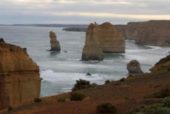Vanuatu may sue fossil fuel industry and countries that support it
Published on: November 30, 2018

For island nations like Vanuatu, climate change is not simply about rising power bills, it’s about people’s livelihoods.
While countries like Australia enjoy the economic benefits of polluting coal production, nations like Vanuatu are paying the price for climate change.
Now Vanuatu wants to fight back.
This week it put the fossil fuel industry on notice that damage from climate change will not go unchallenged.
At the Climate Vulnerable Forum’s Virtual Summit on Thursday, Vanuatu’s Minister of Foreign Affairs, Ralph Regenvanu, said his country was exploring legal actions against the world’s most polluting fossil fuel corporations and countries facilitating the industry, for their roles in creating catastrophic climate change.
“Vanuatu is on the front lines of climate change and yet we have benefited least from the exploitation of fossil fuels that has caused it,” he said.
Vanuatu is internationally recognised as one of the most vulnerable countries in the world to the impacts of climate change. More than 80 per cent of the population’s livelihoods are linked to weather sensitive industries such as agriculture, fisheries and tourism. Its jobs are highly susceptible to changes in weather and climate.
Mr Regenvanu said the government was exploring all avenues, including under international law, to shift the costs of climate protection back on to those which have created the problem.
His announcement comes after individuals in the US, Peru and Philippines launched legal actions to hold oil, gas and coal companies accountable over climate change.
–– ADVERTISEMENT ––
This includes a group of young people in the US who are suing the US Government for its failure to act on climate change.
If Vanuatu moves forward with its threat it will be the first nation state in the world to seek legal redress from the corporations profiting the most from carbon polluting activities.
Many of Vanuatu’s islands sit less than a metre above sea level and severe weather events such as Cyclone Pam, have had devastating impacts. The cyclone in 2015 killed about 15 people in Vanuatu, left 75,000 homeless and caused more than $590 million in damage
“That’s equivalent to 64 per cent of the Vanuatu’s GDP,” Greenpeace Australia Pacific head of pacific net Kelvin Anthony said. “The Pacific is not holding back anymore
“We will take every step we can to up the pressure on the high polluting economies. It is our right to survival.”
Vanuatu is home to 260,000 residents and is constituted of 82 volcanic islands dispersed across 1,280km of sea.
In October the UN’s Intergovernmental Panel on Climate Change released a special report that said the world only had 10 years to act if it wanted to keep climate change to moderate levels.
The world has already warmed by about 1C above pre-industrial levels and is likely to reach 1.5C between 2030 and 2052 if it continues to increase at the current rate.
If temperatures were to rise to 2C, virtually all the world’s coral reefs would be lost from 2050 onwards, including Australia’s Great Barrier Reef.
The report put forward four scenarios to reach the 1.5C target and all of them include a dramatic reduction in the use of coal for electricity generation to practically zero per cent by 2050.






